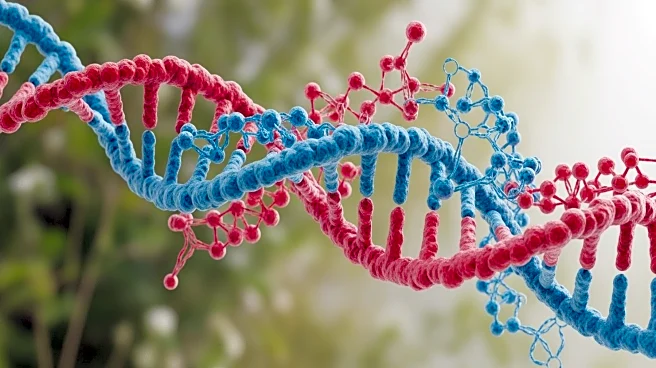What's Happening?
A recent study published in Nature highlights advancements in adenine base editing therapies through the use of hybrid guide RNAs. The research focuses on improving the specificity and efficiency of in vivo adenine base editing, particularly targeting
the PAH P281L variant associated with phenylketonuria (PKU). The study introduces hybrid guide RNAs that incorporate DNA nucleotide substitutions to reduce off-target editing while maintaining high on-target editing efficiency. The research demonstrates successful correction of the PAH P281L variant in both cellulo and in vivo models, with significant reductions in bystander and off-target editing. The study also explores the application of these hybrid guide RNAs to other genetic variants, such as the ABCC6 R1164X variant linked to pseudoxanthoma elasticum (PXE), showcasing the potential for broader therapeutic applications.
Why It's Important?
This development is significant as it addresses a major challenge in gene editing: minimizing off-target effects while ensuring precise correction of genetic mutations. The use of hybrid guide RNAs could enhance the safety and efficacy of gene therapies, making them more viable for clinical applications. This advancement could benefit patients with genetic disorders like PKU and PXE by providing more accurate and reliable treatment options. The study's findings may also influence future research and development in the field of genetic medicine, potentially leading to new therapies for a range of genetic conditions.
What's Next?
The study suggests further exploration of hybrid guide RNAs for other genetic targets, potentially expanding the range of treatable conditions. Future research may focus on optimizing these guide RNAs for clinical use, including testing in human trials. The findings could prompt regulatory discussions on the approval of gene therapies utilizing this technology. Additionally, the study's approach may inspire similar innovations in other areas of genetic research, fostering advancements in personalized medicine.
Beyond the Headlines
The ethical implications of gene editing continue to be a topic of debate, particularly concerning the potential for unintended genetic modifications. The study's emphasis on reducing off-target effects addresses some ethical concerns, but ongoing dialogue is necessary to navigate the complexities of genetic interventions. The long-term impact of such therapies on genetic diversity and the potential for misuse in non-therapeutic contexts remain critical considerations.
















